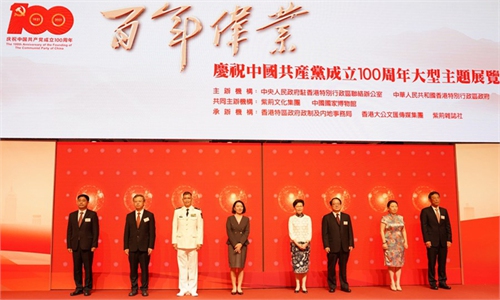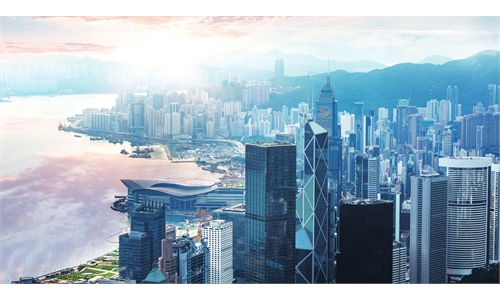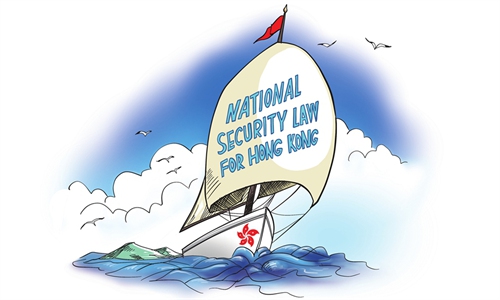High time for CPC to dispel misunderstanding and engage in open interaction with HK residents: Cheung
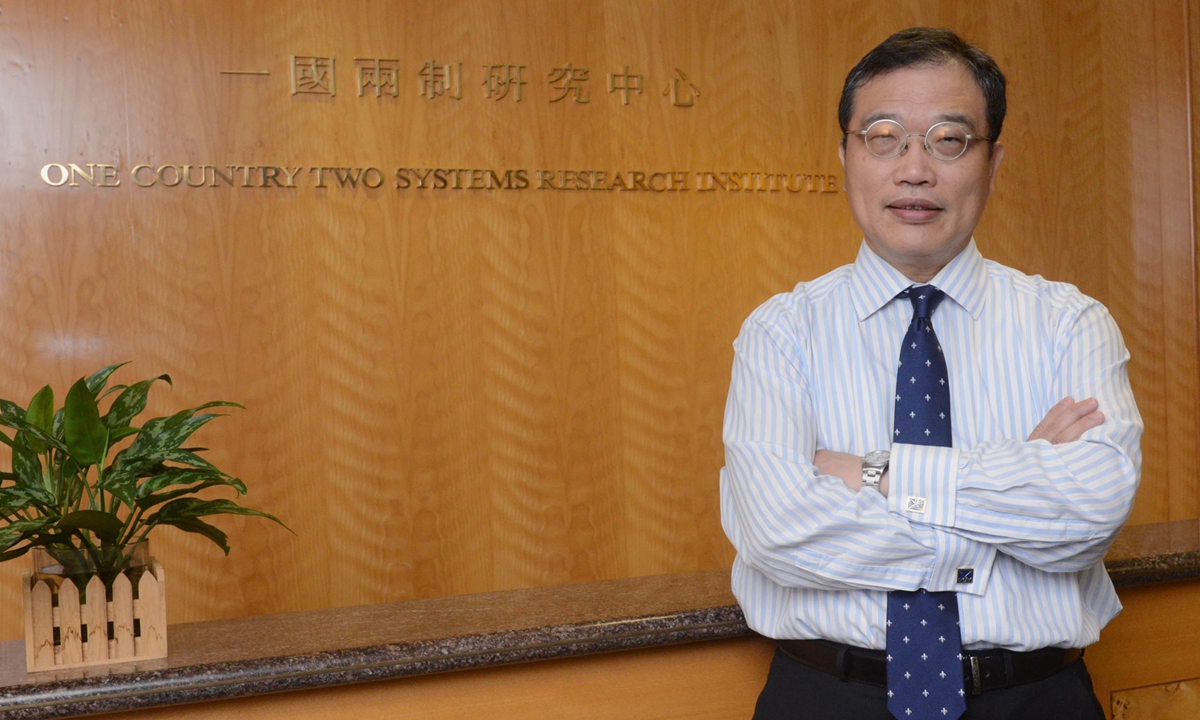
Cheung Chi-kong
A year after the national security law for Hong Kong took effect and as the city undertook electoral reform, social stability has been restored in the special administrative region and black-clad protests are a thing of the past. The city, as one of the world's major financial hubs, has also seen positive changes by breaking an unproductive political infighting cycle and fixing loopholes in local governance, which can no longer be abused for purposes of engaging in subversive activities. All these changes gave new hope to locals and Hong Kong-based businesses, however, local politicians said there remains a lot of work to do in safeguarding national security, enhancing public awareness, and deepening their understanding of the country and the leadership of the Communist Party of China (CPC). While Hong Kong is scheduled to hold three important elections in coming months, Global Times reporters Chen Qingqing and Bai Yunyi (GT) talked with some prominent politicians in Hong Kong including Cheung Chi-kong (Cheung), a close aide to Leung Chun-ying, former HKSAR chief executive and executive director of the "one country, two systems" research institute, on the changing political environment and the new challenges.
GT: Recently, Hong Kong residents held a number of activities to celebrate the 24th anniversary of Hong Kong's return to the motherland and the 100th anniversary of the founding of the Communist Party of China (CPC), how do you see the changes of the role of the CPC in Hong Kong society, considering it has remained rather low-profile for years?
Cheung: Before Hong Kong returned to the motherland, the relationship between Hong Kong and the CPC had been delicate, as the city's 100-year history is complex. However, when you look at the Constitution or the Basic Law, there's no article stipulating that the CPC can't openly conduct activities in Hong Kong. While the CPC remained low-profile in the past, it considered that such a low-profile was appropriate under a certain historical context.
But we should keep up with the times. In the past, there were many people who had a misunderstanding about the CPC, which appeared to be in the form of sensitive words. In fact, the leadership of the CPC is recognized by the Constitution, both in its political and legal status. Meanwhile, the central government emphasizes on its full jurisdiction over Hong Kong. Where's the full jurisdiction? It's in the hands of the CPC.
The CPC has the full jurisdiction over Hong Kong, and it can't always undertake its activities in the shadows. Without establishing a legitimate position and without carrying out open activities, how would the CPC explain to others that it's the ruling Party that has full jurisdiction over Hong Kong? So eventually, it has to come out of its low-profile status to communicate with residents in Hong Kong in a straightforward and open manner, while fixing some political problems from the past.
So it's now the appropriate time for the CPC to have an open and straightforward interaction with residents in Hong Kong. This was just a matter of time, and we should talk about it in a clear way, as the CPC won't be afraid of being criticized by others when it faces historical judgment. Over the past 100 years, what the Party has achieved should make everyone understand its role.
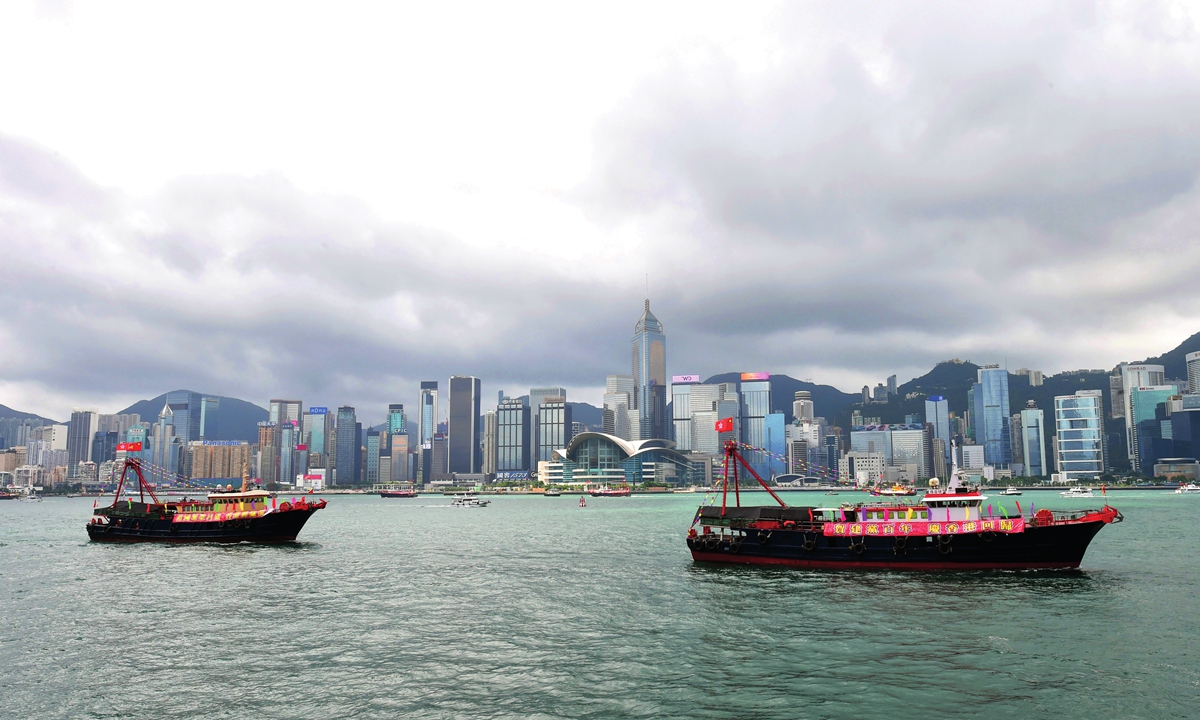
Fishing boats in Hong Kong are draped with celebratory flags and banners marking the 100th anniversary of the founding of the CPC and Hong Kong's 24th anniversary of return to China. Photo: IC
GT: Under the national security law for Hong Kong and with the electoral reform, Hong Kong has restored social stability over the past year; however, the city still faces security challenges considering the recent "lone-wolf" attack against a Hong Kong police officer and the latest arrests over a bomb plot. Do you think such "lone-wolf" attacks or terrorist plots will be a future trend in Hong Kong?
Cheung: Over the past year, some organizations endangering national security could no longer operate. Certain self-deemed media outlets, which did not engage in media-relevant activities, stopped operating. However, individual "lone-wolf" attacks may continue existing for a while, at the back of which, there might be certain networks that have connections with international networks. When we take terrorist attacks in foreign countries into account, many have not been well organized but have gained certain messages of support from the outside world. Apparently, they were "lone-wolf" styles of attack, but they have certain networks functioning behind them. There's no exception for Hong Kong.
Despite the challenges, Hong Kong authorities, especially the national security department of the Hong Kong Police Force, are capable of tackling those potential risks, and individual cases can be brought under control.
GT: There was a big reshuffle in the HKSAR government recently. What's the message being delivered by this reshuffle and what's the expectation for the next HKSAR government after the three major elections in the coming months?
Cheung: Carrie Lam, chief executive of the HKSAR government, has expressed the expectation for John Lee Ka-chiu, who was recently appointed as the chief secretary for the HKSAR government that is conducting full-scale activities in safeguarding the national security, as the work can't be done only by the Security Bureau and the Hong Kong Disciplined Services considering the overall situation.
In the future, Lee will likely have to conduct full-scale work in other sectors including education and finance.
I also think the next government will be a tough one, as the next chief executive will have a strong position, with greater capability, a vision, and shoulder responsibilities while fully understanding the international environment. The questions about Hong Kong are not only related to the city, but there are external forces behind them. For example, there are some rioters who fled overseas, while some foreign countries made comments on Hong Kong affairs.
The future chief executive should have the courage to confront all those challenges and push their agenda forward.
GT: As you are close to Leung Chun-ying, do you think he will be a suitable candidate for the next chief executive? Do you know whether he has the willingness to take part in the election?
Cheung: Considering his capability as he had been the chief executive for five years, I think he is 100 percent suitable for this position, which, of course, needs various kinds of cooperation. It also depends on his own willingness.

The Hong Kong Police College organizes a passing-out parade during the graduation ceremony on July 10 with Chinese-style military formations.Photo: Xinhua
GT: As Hong Kong will see three major elections, do you think they will be carried out in a peaceful and democratic manner? What are the challenges we will face?
Cheung: Considering the current overall environment, these three elections should be undertaken smoothly. But it's hard to say that there won't be any external interference. Hong Kong is an international city, which has also been one of the most opened-up cities in China to the rest of the world. Foreign forces have many ways of taking part in Hong Kong affairs, however, they won't have any fundamental influence on the elections. When there are no attempts of sabotaging, subverting, or seeking power in the elections, the characteristics of true democracy can be fully realized.
There will also be gradual changes in our political environment. Some supporters of the opposition camp may not go to vote this time. It takes some years to see a changing environment. They also need time to understand the situation and accept other groups' political perspectives.
Over the past decades, we've spent so much time in political battles, which has led the political soil of Hong Kong to be poisoned. With the national security law for Hong Kong and electoral reform, we also need to cultivate a good political culture by excluding those people who intended to seek power or aimed to subvert the CPC. With a healthy political culture, different groups including some in opposition of the governmental policies can engage in competitions by coming up with more favorable policies while more political talents can be cultivated in such an environment.
In the next 10 years, the most important thing we should do is to establish such new political cultures and new political guidelines while cultivating a new batch of political talent.

